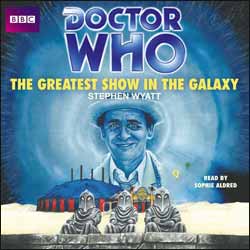|
Click here to return to the main site. Audio Book Review
Creepy! That’s what Ace thinks of clowns. But the Doctor insists on entering the talent contest at the Psychic Circus, the self-proclaimed Greatest Show in the Galaxy, on the planet Segonax. What has reduced this world to an arid wasteland? Why have the happy-go-lucky circus folk stayed here so long? And why are they no longer happy? Above all, what is the dreadful truth about the “talent contests” run by the sinister Ringmaster and his robot clowns? The Doctor and Ace need all of their death-defying skills in the big top to uncover a brooding, ancient evil that has broken the spirit of the Circus and demanded the sacrifice of so many lives... Often when script writers get the chance to novelise their own stories, they take the opportunity to flesh them out, to give us a lot of backstory, and to reinstate ideas that were dropped from the screen version for reasons of time or expense. Unfortunately, that is not the case here. Stephen Wyatt adds little to the story that was not present on screen, apart from the advertising satellite approaching the TARDIS in space, and the buried robot head speaking a few words, pleading with a plaintive voice to be let out. The author has admitted (in an interview in issue 263 of Doctor Who Magazine, April 1998) that his primary motivation for writing the book was financial, which probably explains the relative lack of effort he appears to have put into it. He does little to mitigate either the Doctor’s slowness to cotton on to Mags’s true nature, or his incredible leap of logic in guessing where the eyeball from Deadbeat’s medallion has been hidden. And just count how many times Ace says things “hotly”. Nor does Wyatt explore the origins of the mysterious Gods of Ragnarok (though later original novels, in particular All-Consuming Fire, have indicated that they are Great Old Ones, survivors from a previous universe). However, the author does clarify the purpose of the energy exchange that takes place between the Gods towards the end of the story. Perhaps in response to the tone of the text itself, or maybe as a result of her years in children’s broadcasting, Sophie Aldred (who played Ace) seems to pitch her reading as though to a younger audience. As usual, her version of the Seventh Doctor is more Scottish than Sylvester McCoy’s portrayal ever was (sounding not unlike Amy Pond at times). Similarly, Aldred gives Captain Cook a distinctive Irish accent, probably picking up on the nationality of T P McKenna, the actor who played him on screen. Other voices are closer to their television counterparts, in particular the Stallholder (a remarkable impersonation of Peggy Mount) and the Gods of Ragnarok (with vocal treatment by sound designer Simon Power). Power’s incidental score includes some of the same traditional circus music as can be heard on the screen version. Other parts of the sound design use similar synthesised notes to Mark Ayres in his television score. Despite its flaws, this unabridged audio book does make me want to watch the original four-part serial again. I am particularly struck by how much this story epitomises the McCoy era as a whole, comfortably combining the often disparate narrative styles of “oddball comedy” and “arch manipulator”. On a number of levels, The Greatest Show in the Galaxy is all about Doctor Who itself. The Psychic Circus is obviously a parody of the series, chewing up and spitting out an endless array of performers, like the many actors who have played the lead role. The Gods of Ragnarok can be viewed as the television audience, or critics, or heartless BBC executives. Whizzkid is the show’s anally retentive “biggest fan”, though he admits that it’s not as good as it used to be in the old days. He is also a fan of the intergalactic explorer Captain Cook, who is also a version of the Doctor. Like the Doctor, the Captain has a companion (Mags) who is troubled by inner demons, who he took under his wing for his own selfish reasons: “You didn’t do it for me,” says Mags, “you did it for yourself.” By the end of the story, Mags has latched on to another analogue of the Doctor, in the form of Kingpin. The show is over (as indeed was the original run of Doctor Who by the time this novelisation saw print in December 1989), but it is ready to be reborn with a new cast. Though this isn’t the greatest book in the galaxy, it is a reminder that Doctor Who is the most versatile show on Earth. 6 Richard McGinlay Buy this item online
|
|---|


